Dirt Contractors Wilmington
Find top Dirt Removal in Wilmington
Receive up to 3 Dirt Removal quotes for your project today! Compare profiles, reviews, accreditations, portfolio, etc... and choose the best service.
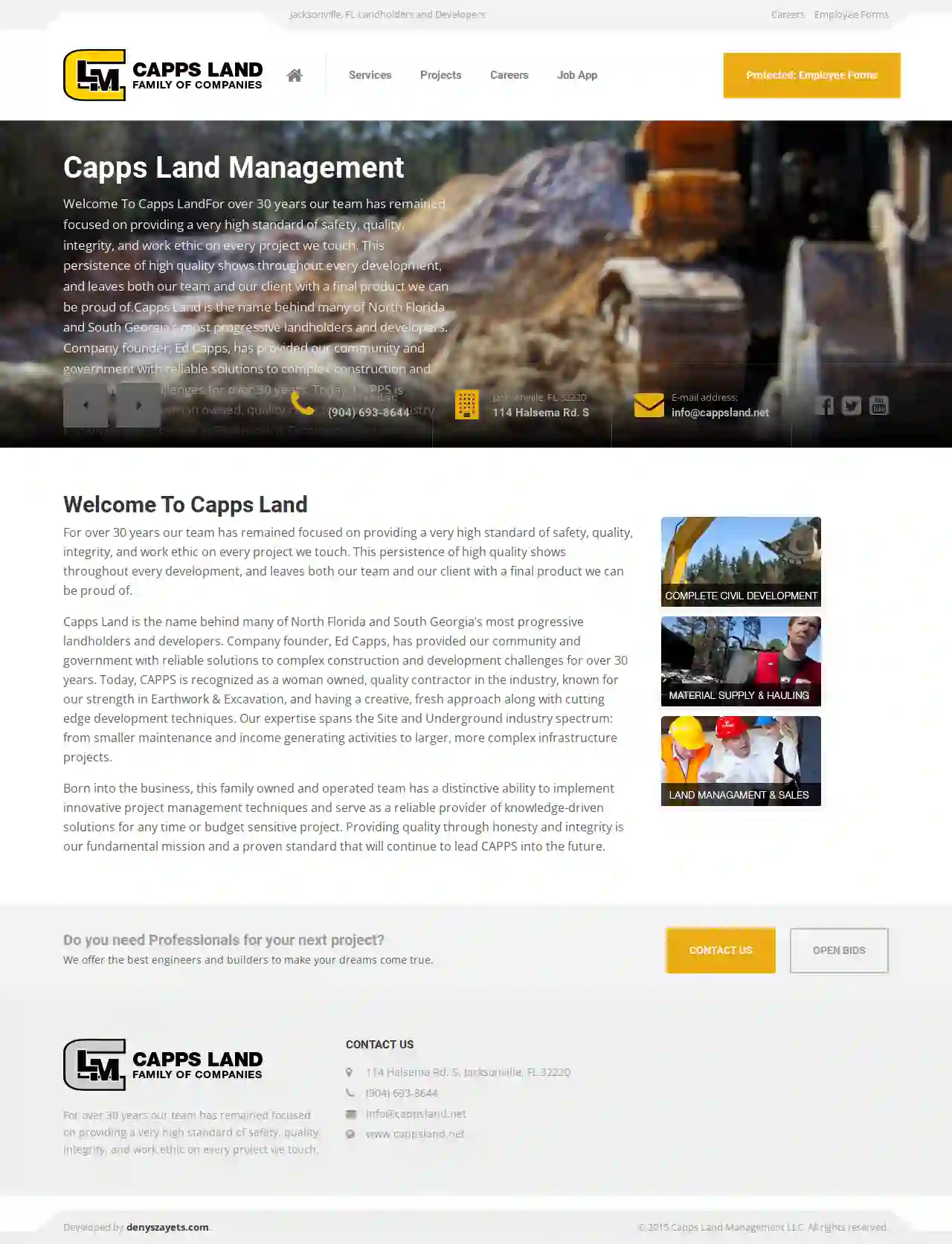
Capps Land Management Inc
3.212 reviewsJacksonville, US- Services
- Why Us?
Get Quote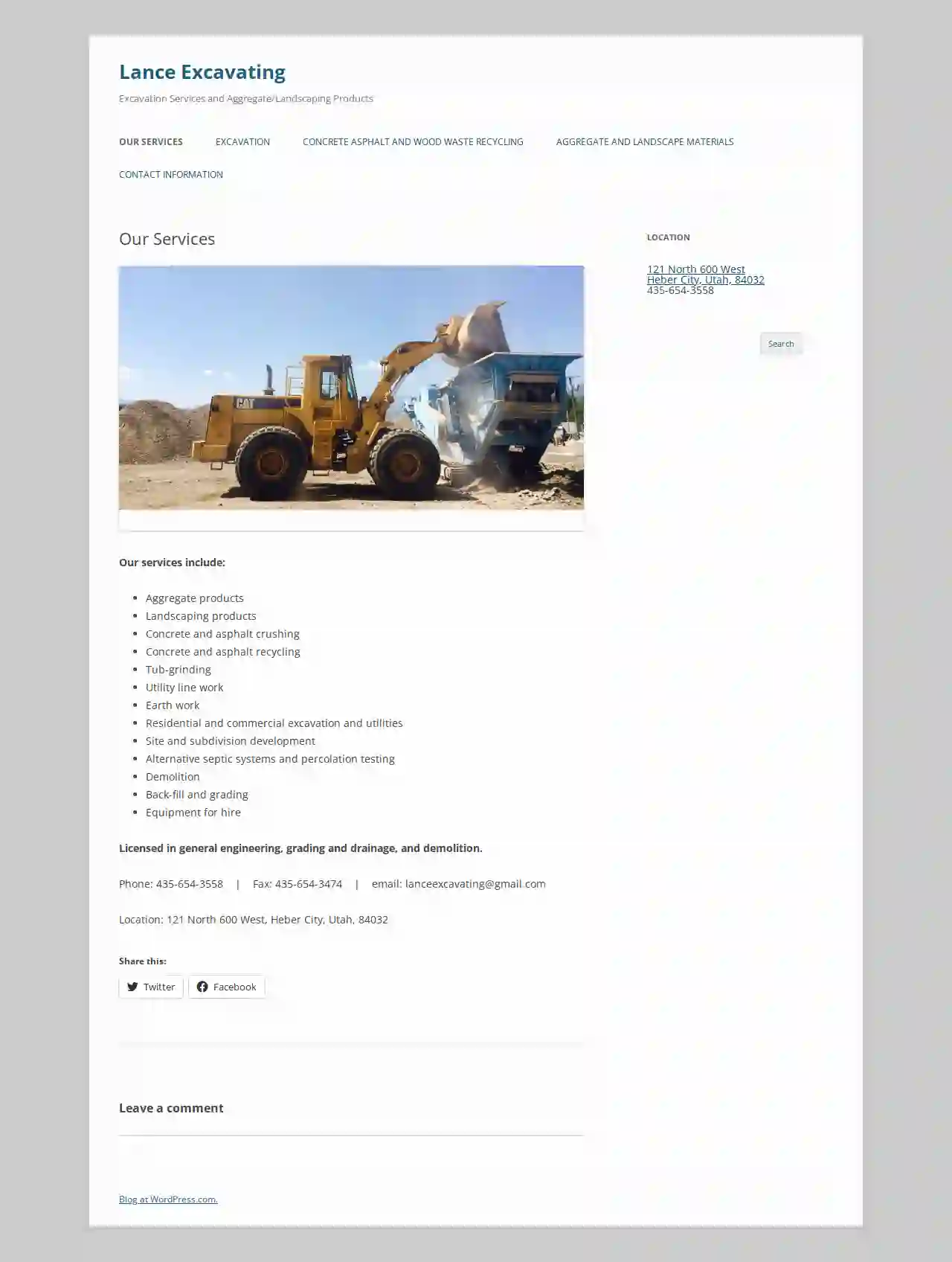
Lance Excavating Inc
4.818 reviews121 North 600 West, Heber City, 84032, USLance Excavating Lance Excavating is a trusted provider of excavation services and aggregate/landscaping products in the Heber City, Utah area. We offer a wide range of services to meet the needs of both residential and commercial clients. Our team of experienced professionals is committed to providing high-quality work at competitive prices. We are licensed in general engineering, grading and drainage, and demolition. We are dedicated to providing our clients with the best possible service and exceeding their expectations. We are committed to safety and environmental responsibility. We are proud to be a part of the Heber City community and look forward to serving your needs.
- Services
- Why Us?
- Gallery
Get Quote
Mccoy Excavating Company Georgetown, KY
546 reviewsDurham, USWelcome to McCoy Excavating, your premier full-service excavation company in Georgetown, KY. With an A+ rating from the BBB, we are fully licensed and insured, ready to handle all your excavation needs in Georgetown and Lexington, Kentucky. Why Choose McCoy Excavating? We take the time to get to know our customers, providing customized services tailored to each individual need. Expertise: Our team of experts is here to help with a wide range of services, including: Indoor and outdoor riding arenas New home site preparation Metal building pad excavation Pole barn leveling New driveway and road construction Backfilling Land clearing Demolition Lot clearing for new home sites Horse arena construction Gravel driveway installation and repair Grading and more Whether you need a new gravel driveway in Georgetown or a professional team to build your dream horse arena in Lexington, McCoy Excavating is here to deliver top-notch service and quality results. Contact Us Today! For all your excavation needs, trust the experts at McCoy Excavating Company. We’re committed to excellence and ready to serve you.
- Services
- Why Us?
- Gallery
Get Quote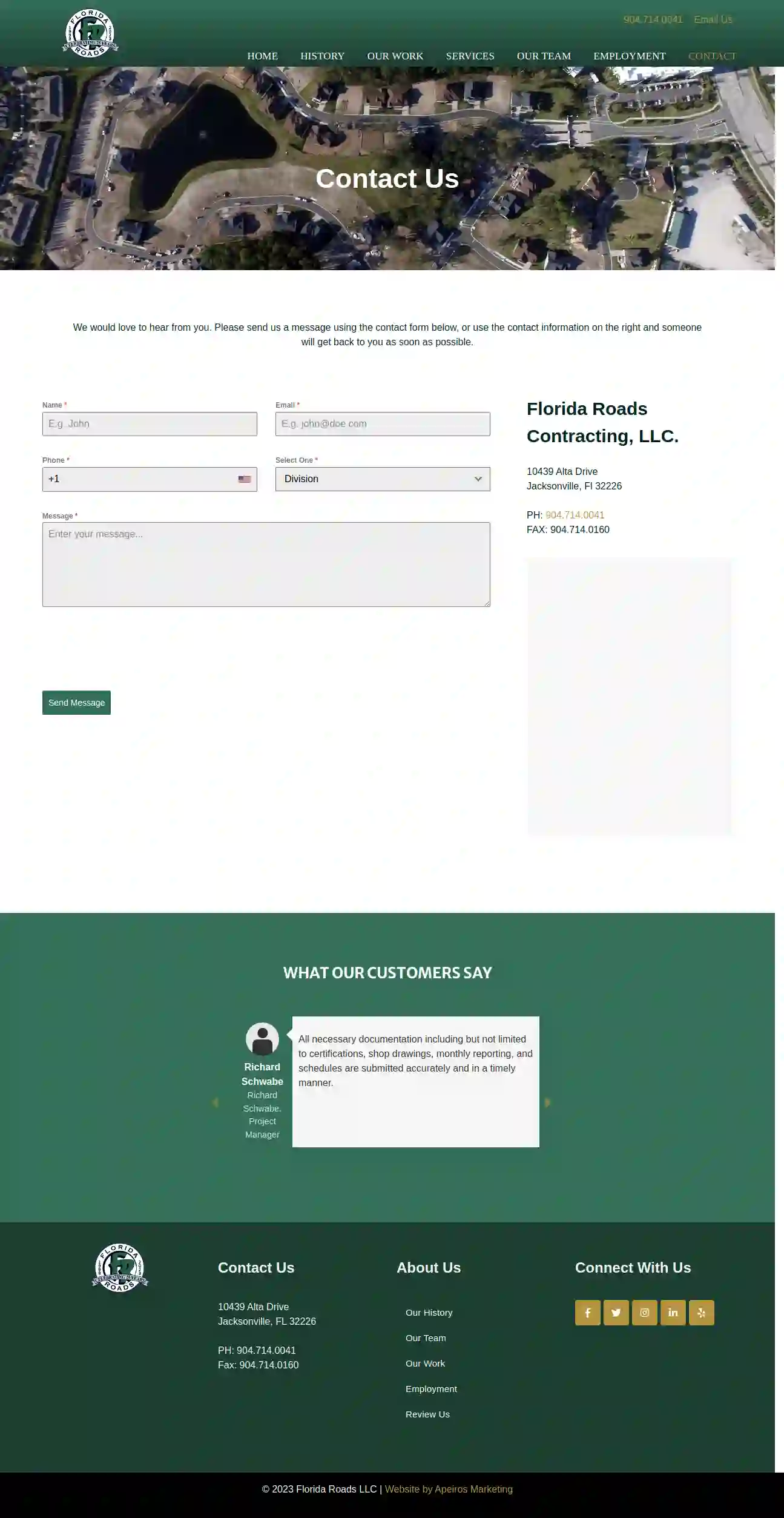
Florida Roads LLC
110439 Alta Drive, Jacksonville, 32226, USFLORIDA ROADS Your Trusted Site Development, Construction Service, and Road Construction Company Welcome to Florida Roads LLC, where we take immense pride in being your trusted partner for all your site development, construction service, and road construction needs. With years of experience in the industry, we have garnered a reputation for excellence, quality, and reliability. Whether you’re embarking on a small-scale project or a large-scale venture, our professional team is here to ensure your vision becomes a reality. FLORIDA ROADS A Comprehensive Range of Services As a leading site development company, construction service company, and road construction company, we offer a comprehensive range of services tailored to meet your unique requirements. From initial planning and design to efficient execution and timely completion, we have the expertise and resources to handle every aspect of your project with utmost efficiency. FLORIDA ROADS Our Commitment to Quality At Florida Roads LLC, we understand that the success of any project lies in the quality of its execution. That’s why we maintain stringent quality control measures at every stage of the construction process. Our team of skilled professionals uses state-of-the-art equipment and adheres to industry best practices to ensure that every project meets the highest standards of quality.
- Services
- Why Us?
- Testimonials
- Gallery
Get Quote
ERS Corp
56 reviewsJacksonville, US- Services
- Why Us?
Get Quote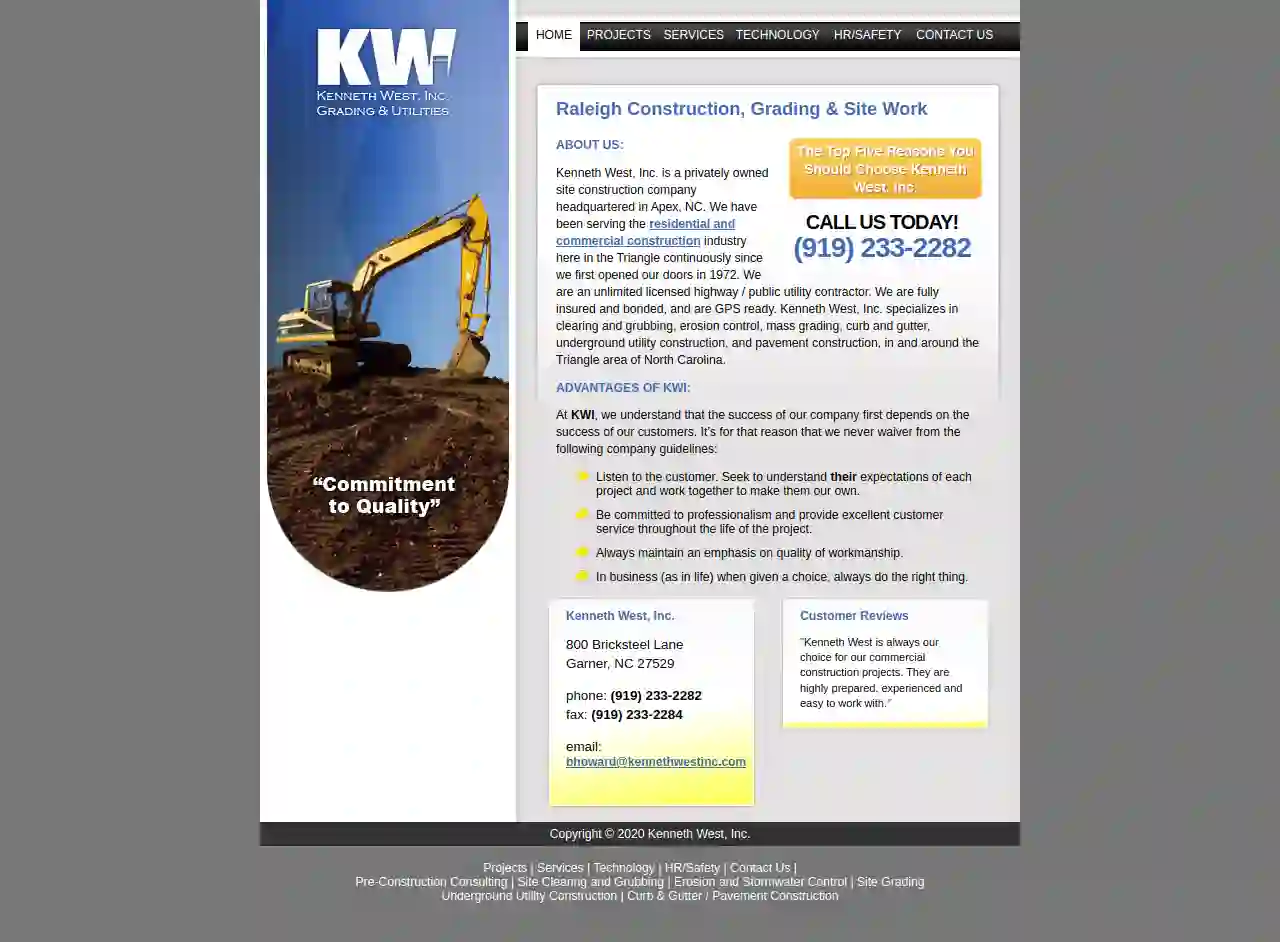
Kenneth West Inc
45 reviews800 Bricksteel Lane, Garner, 27529, USAbout Us Kenneth West, Inc. is a privately owned site construction company headquartered in Apex, NC. We have been serving the residential and commercial construction industry here in the Triangle continuously since we first opened our doors in 1972. We are an unlimited licensed highway / public utility contractor. We are fully insured and bonded, and are GPS ready. Kenneth West, Inc. specializes in clearing and grubbing, erosion control, mass grading, curb and gutter, underground utility construction, and pavement construction, in and around the Triangle area of North Carolina. Advantages of KWI At KWI, we understand that the success of our company first depends on the success of our customers. It’s for that reason that we never waiver from the following company guidelines: Listen to the customer. Seek to understand their expectations of each project and work together to make them our own. Be committed to professionalism and provide excellent customer service throughout the life of the project. Always maintain an emphasis on quality of workmanship. In business (as in life) when given a choice, always do the right thing.
- Services
- Why Us?
- Testimonials
- Gallery
Get Quote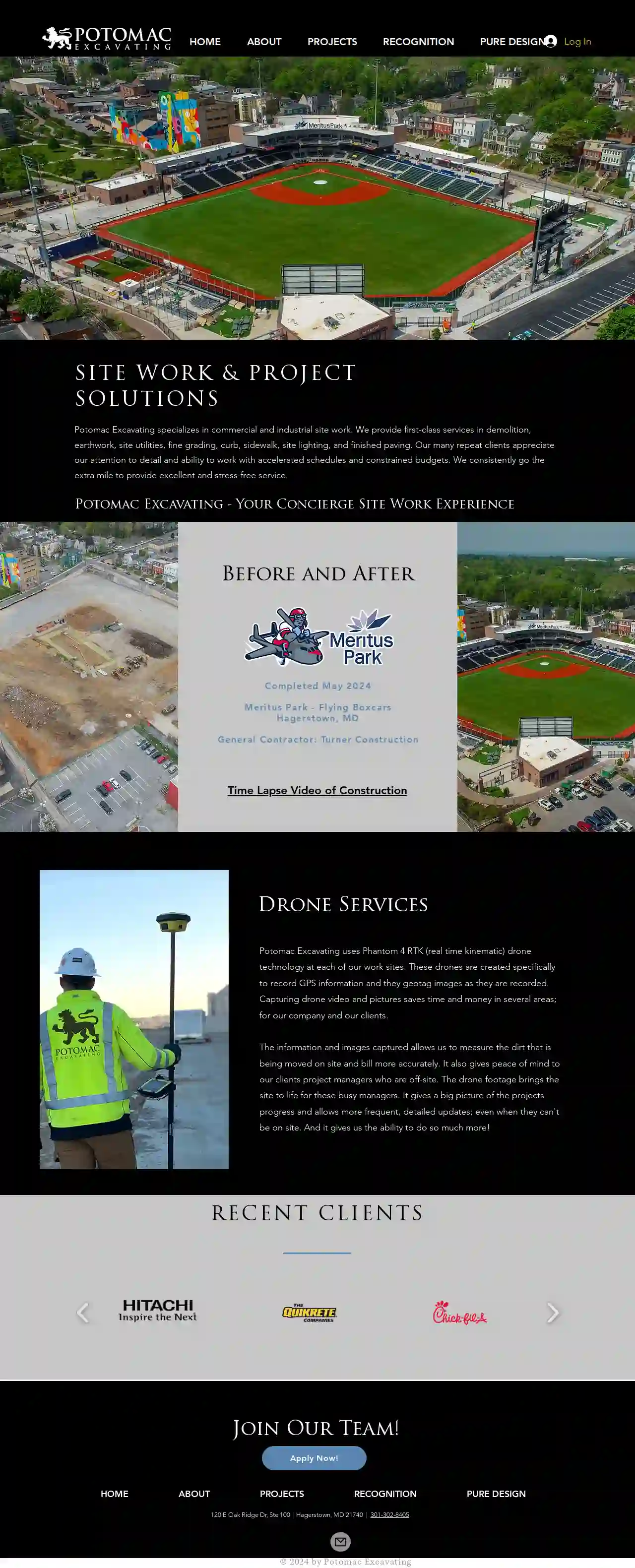
Potomac Excavating
4.37 reviews120 E Oak Ridge Dr, Ste 100, Hagerstown, 21740, USPotomac Excavating specializes in commercial and industrial site work. We provide first-class services in demolition, earthwork, site utilities, fine grading, curb, sidewalk, site lighting, and finished paving. Our many repeat clients appreciate our attention to detail and ability to work with accelerated schedules and constrained budgets. We consistently go the extra mile to provide excellent and stress-free service. Potomac Excavating - Your Concierge Site Work Experience
- Services
- Why Us?
- Gallery
Get Quote
Raleigh Waterproofing Inc
4.830 reviewsRaleigh, USWelcome To Raleigh Waterproofing Raleigh Waterproofing Inc. was established in May 2001 by David Hawkins II to provide quality service, expert support and knowledge to everyone. There is nothing more important than the customer’s complete satisfaction! We excel in both residential and commercial waterproofing and repairs. We have built our reputation on honest advice, quality service and continued customer support. Our motto has always been, “You haven’t seen expensive until you hire an amateur”. WHO WE ARE We provide you with services you need at prices you can afford. You deserve the best waterproofing services, and Raleigh Waterproofing is dedicated to providing you those services! OUR MISSION To treat each project as special, and worthy of our best work. We will assist you with each phase of your project in a professional and courteous manner. OUR VISION To become the benchmark for quality new construction and commercial waterproofing work. Through continuous improvements in integrity, teamwork, and creativity of our people.
- Services
- Why Us?
- Gallery
Get Quote
Hawkins Excavation
1Clarkson, 42726, USAbout Us Precision excavation, shaping landscapes, building your dreams. Our excavation company utilizes top-of-the-line equipment to ensure the job is done right, on time, and within budget. When you need to kick off your project swiftly, our team of qualified experts is there with superior excavation contracting, septic systems installation, and retaining walls. You can always rely on our company for precise work and dedicated customer service.
- Services
- Why Us?
- Gallery
Get Quote
Metcon Construction Inc
52 reviewsPembroke, NC, (Headquarters), USMetcon provides a full range of General Contracting services for both public and private clients. We deliver innovative and sustainable buildings that shape how people learn, live, and experience our communities. Our Mission To successfully deliver projects that positively impact our clients, the environment, our employees, and the communities in which we live and work. Core Values Safety On Time Delivery Diversity and inclusion Environmental sustainability Client satisfaction Quality Innovation and technology
- Services
- Why Us?
- Gallery
Get Quote
Over 3,943+ Excavation Pros registered
Our excavation providers operate in Wilmington & surroundings!
ExcavationHQ has curated and vetted Top Excavation Contractors arround Wilmington. Find a top & reliable contractor today.
Frequently Asked Questions About Dirt Contractors
- Plant Selection: Understanding your soil's pH and nutrient levels helps you choose plants that will thrive in those conditions.
- Fertilizer Recommendations: Soil tests reveal nutrient deficiencies, allowing you to apply appropriate fertilizers to meet plant needs.
- Soil Amendments: Identify soil imbalances, such as compaction or high clay content, and recommend amendments to improve soil structure and drainage.
- Construction Projects: Assess soil bearing capacity and other properties to ensure the stability and safety of foundations and other structures.
- Environmental Assessments: Detect potential soil contamination and determine the need for remediation.
- Spring and Fall: Generally considered the optimal seasons in many regions, as the weather is typically mild and the ground is workable.
- Summer: Can be suitable if the weather isn't excessively hot and dry, but ensure adequate watering to prevent soil from drying out.
- Winter: Often challenging due to frozen ground, snow, and potential for delays. However, some contractors may be available for deliveries if conditions permit.
- Dirt Removal: Excavating and hauling away excess dirt or soil from construction sites, landscaping projects, or other areas.
- Dirt Delivery: Transporting and delivering various types of dirt, such as topsoil, fill dirt, sand, or gravel, for construction, landscaping, or gardening purposes.
- Grading: Leveling or sloping land to achieve specific contours for drainage, landscaping, or construction projects.
- Excavation: Digging trenches, foundations, basements, pools, or other structures requiring earthmoving.
- Land Clearing: Removing trees, vegetation, and debris to prepare land for development or other uses.
- Site Preparation: A combination of services, including clearing, grading, and compaction, to prepare a site for construction or landscaping.
What is a soil test, and why is it important?
What is the difference between screened topsoil and unscreened topsoil?
Screened Topsoil: Processed through a screening machine to remove large debris, rocks, and clumps, resulting in a finer and more uniform texture. It's generally considered higher quality and is preferred for landscaping, gardening, and lawn establishment.
Unscreened Topsoil: Not processed through a screening machine and may contain various sizes of debris, rocks, and clumps. It's typically less expensive than screened topsoil but may require additional work to remove debris before use.
Choosing between screened and unscreened topsoil depends on your project's specific needs and budget.
What is the best time of year to have dirt delivered?
What services do dirt contractors provide?
What is a soil test, and why is it important?
- Plant Selection: Understanding your soil's pH and nutrient levels helps you choose plants that will thrive in those conditions.
- Fertilizer Recommendations: Soil tests reveal nutrient deficiencies, allowing you to apply appropriate fertilizers to meet plant needs.
- Soil Amendments: Identify soil imbalances, such as compaction or high clay content, and recommend amendments to improve soil structure and drainage.
- Construction Projects: Assess soil bearing capacity and other properties to ensure the stability and safety of foundations and other structures.
- Environmental Assessments: Detect potential soil contamination and determine the need for remediation.
What is the difference between screened topsoil and unscreened topsoil?
Screened Topsoil: Processed through a screening machine to remove large debris, rocks, and clumps, resulting in a finer and more uniform texture. It's generally considered higher quality and is preferred for landscaping, gardening, and lawn establishment.
Unscreened Topsoil: Not processed through a screening machine and may contain various sizes of debris, rocks, and clumps. It's typically less expensive than screened topsoil but may require additional work to remove debris before use.
Choosing between screened and unscreened topsoil depends on your project's specific needs and budget.
What is the best time of year to have dirt delivered?
- Spring and Fall: Generally considered the optimal seasons in many regions, as the weather is typically mild and the ground is workable.
- Summer: Can be suitable if the weather isn't excessively hot and dry, but ensure adequate watering to prevent soil from drying out.
- Winter: Often challenging due to frozen ground, snow, and potential for delays. However, some contractors may be available for deliveries if conditions permit.
What services do dirt contractors provide?
- Dirt Removal: Excavating and hauling away excess dirt or soil from construction sites, landscaping projects, or other areas.
- Dirt Delivery: Transporting and delivering various types of dirt, such as topsoil, fill dirt, sand, or gravel, for construction, landscaping, or gardening purposes.
- Grading: Leveling or sloping land to achieve specific contours for drainage, landscaping, or construction projects.
- Excavation: Digging trenches, foundations, basements, pools, or other structures requiring earthmoving.
- Land Clearing: Removing trees, vegetation, and debris to prepare land for development or other uses.
- Site Preparation: A combination of services, including clearing, grading, and compaction, to prepare a site for construction or landscaping.